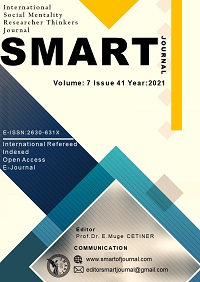Author :
Abstract
Türkiye’de mevcut olan genç nüfus bir taraftan Türkiye ekonomisi için avantaj yaratırken diğer taraftan temel makroekonomik göstergelerde ciddi etkilere yol açmaktadır. Türkiye ekonomisi her geçen gün hızla artmakta olan genç nüfusa yönelik istihdam yaratmak zorundadır. Dolayısıyla genç nüfus çok boyutlu ekonomik problemlerin kaynağı olabilmektedir. Türkiye ekonomisinde aktif nüfus oldukça yüksek düzeyde olmasına rağmen işgücüne katılım düzeyi çok düşüktür. Diğer gelişmekte olan ülkelerle benzer biçimde Türkiye’de de işsizlik olgusu yapısal bir takım özellikler taşıdığı için, işsizliğin giderilmesi amacıyla uzun vadeli ve verimli ekonomi politikalarına gereksinim duyulmaktadır. Bu bağlamda genç nüfus yoğunluğu Türkiye ekonomisinde öncelikli olarak istihdam sorunu yaratmaktadır. Daha sonra eğitim, gelir dağılımı adaleti, kişi başına düşen gelir, büyüme gibi alanlarda olumsuz sonuçlar doğurabilmektedir. Çalışmanın amacını Türkiye’deki genç nüfus profilinin incelenmesi oluşturmaktadır. Bu amaç doğrultusunda TÜİK’in resmi internet sitesinde bulunan toplumsal yapı istatistikleri verilerinden yararlanılmıştır. Çalışmanın sonucunda Türkiye’deki genç nüfus oranındaki artışın ekonomi üzerinde kalıcı sorunlar yarattığı ve bu sorunların başında istihdam sorunun geldiği görülmüştür.
Keywords
Abstract
On one hand young population of the country creates advantages for Turkey’s economy, on the other hand it has important effects on the basic macroeconomic indicators. Turkey's economy must create employment for the young population rapidly increasing with each passing day. Therefore, the young population can be the source of multidimensional economic problems. Although the active population in Turkey's economy at a very high level of participation in the labor force is very low level. As with other developing countries in a similar manner to Turkey structural unemployment phenomenon team features move, in order to eliminate unemployment is a need for long-term and efficient economic policies. In this context young population density is to create employment problem as a priority issue for Turkey’s economy. Later, it may have negative consequences in areas such as education, income distribution justice, per capita income, and growth. The aim of the study is to study the young population profile in Turkey. For this purpose, social structure statistics data on the official website of TUIK were used. At the result of the study the increase in the proportion of young population in Turkey caused persistent problems on economy and has been observed that the employment problem at the beginning of these problems.
Keywords
- Ansal, H., Küçükçifçi, S., Onaran, Ö., & Orbay, Z. (2000). Türkiye Emek Piyasasının Yapısı ve İşsizlik,
- Ansal, H., Küçükçifçi, S., Onaran, Ö., & Orbay, Z. (2000). Türkiye Emek Piyasasının Yapısı ve İşsizlik, İstanbul: Türkiye Ekonomik ve Toplumsal Tarih Vakfı.
- Ergöçmen, B. (2007). “Genç Nüfus Avantajı İçin Son 30 Yıl”, http://www.aljazeera.com.tr/profil/banu- ergocmen (Erişim Tarihi: 29.12.2020).
- Garrett, G. (2004). Globalization’s Missing Middle, Foreign Affairs, 83(6), 84–96.
- Karabıyık, İ. (2009). “Avantaj ve Dezavantajlarıyla Genç İşsizliğinin Değerlendirilmesi”, Erzincan Üniversitesi Hukuk Fakültesi Dergisi,13(3/4), 298-299.
- Lee, K. (2013). How Can Korea Be A Role Model For Catch-up Development? A Capabilitybased View,İçinde A. K. Fosu (Ed.), Achieving Development Success: Strategies and Lessons From the Developing World, Oxford: Oxford University Press, 25-49.
- Ohno, K. (2009). “Avoiding The Middle-Income Trap: Renovating Industrial Policy Formulation in Vietnam”, Asean Economic Bulletin, 26(1), 25–43.
- T.C. Aile, Çalışma ve Sosyal Hizmetler Bakanlığı (2020). “Yaşlı Nüfusun Demografik Değişimi”,https://www.ailevecalisma.gov.tr/media/45354/yasli-nufus-demografik-degisimi-2020.pdf (Erişim Tarihi: 28.12.2020).
- TÜİK (2020). “İstatistiklerle Gençlik”, 2019. https://data.tuik.gov.tr/Bulten/Index?p=Istatistiklerle-Genclik- 2019-33731 (Erişim Tarihi: 29.12.2020).





